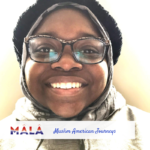Hikmah Okoya: Wisdom
Hikma describes her journey to self-acceptance and empowerment as a Black Muslim woman in the U.S.
Black (\blak\) Adjective : The opposite of white. A pigmentation color too dark to be considered beautiful. The color of bark after it has been burned by fire. The color people here in America where to funerals. The color the permeates the night sky; it makes it so hard to see without a white light. Let me not forget to mention, it is the color I wear on my skin day in and day out.
Female (\fe-male\) Adjective : Another word for woman or lady. The opposite sex of a male. The one that carries the egg. The one that waits nine months to birth another beautiful human being into this world. The caretaker of the family who would do anything to protect her family. I am so grateful to be have been born as a female.
Muslim (\mus-lim\) Noun : The followers of Islam. The servants of Allah. The people who have testified to believe in Allah, the one true God, and the last prophet, Prophet Muhammad (peace and blessings be upon him). The people who follow the five pillars of Islam. People who read the Quran and follow the teachings of Islam. This is the faith in which I follow and the people I am among.
I am a Muslim. These three words describe who I am: Black Female Muslim. I wear this identity with pride and honor. However, to be completely honest, there were times when I questioned my identity. I questioned why my skin was too dark. Why was the color of my skin seen as ugly in the eyes of the media? I questioned why women were belittled and treated inappropriately. Why was my hijab being tugged at in a fourth-grade classroom? Why is Muslim being accused of terrorist acts? These questions started to linger in my head at a young age.
Let me introduce you to fourth grader Hikmah. This is a girl who recently transferred to a non-Muslim school. This new place introduced her to many different identities beyond the Muslim community she grew up until her fourth-grade year. She met students who did not cover their hair with hijabs. She met students who did not know the greetings Muslim say to one another; As-salamu Alaykum (Peace be upon you). However, she was welcomed in with smiles and greetings from her new classmates.
She was able to laugh and share stories about her Muslim friends from her old school. The students played and ate lunch comfortably with her. At least for the moment, it appeared this way.
Later that fall, the teacher shared a tragic event that occurred in the United States with the students. An event Hikmah did not know too much about, but it is an event that turned her fourth-grade year around. This moment in America’s history is what caused Hikmah to be aware of her identity and the role she must play. This moment in America’s history happened on September 11, 2001.
Hikmah spent the rest of her fourth-grade year defending her religion. She was constantly bombarded with questions about Jesus, Hijabs, God, and many more. It was like a battlefield every time she stepped foot into the school. A fight she had to face alone. But this fight helped her to grow into the person she is today. This fight opened her eyes to what she must be careful of. This fight taught her to understand her identity as a Muslim, as a female, and as a black person.
This girl is me. Every time I encounter a crisis with my identity, I think back to my fourth-grade year. That year was a turning point for me in how I protected and wore my identity with pride. Even today, I still receive stares and comments behind my back because of who I am. I am not ashamed of the identity Allah gave me. Rather I am grateful and thankful for it. More importantly, I have been blessed with the most beautiful name my parents gave me, Hikmah. A name I shall carry with honor and pride. A name, its meaning, I must live up to. Hikmah, which means wisdom, is the true definition of my identity as a Black Female Muslim.


